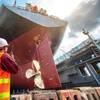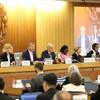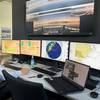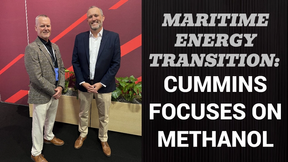Admiral on U.S. Navy & Asia Pacific Re-balancing Act
The commander of U.S. Pacific Command has briefed Pentagon reporters, discussing the U.S. rebalance to the Asia-Pacific region, successful engagement with partners there and conditions for continued stability and security, according to DoD News, Defense Media Activity, as excerpted here.
Navy Adm. Samuel J. Locklear III described some of Pacom's most important activities so far this year, including a visit to Hawaii by Defense Secretary Chuck Hagel, who in April hosted the first informal meeting on U.S. soil of defense ministers from the Association of Southeast Asian Nations, or ASEAN.
The meeting, Locklear said, "was an excellent opportunity to build upon the friendships and strengthen our bilateral relationship with ASEAN member nations."
Next, the admiral said, Rim of the Pacific, or RIMPAC, the world's largest maritime exercise, began June 26 and will end Aug. 1. More than 25,000 military personnel from 22 countries are participating, including troops from China, who are participation for the first time.
Locklear said the exercise has been "an excellent training opportunity for all nations involved," and added that Pacom continues to "work hand in hand with our allies and partners to help ensure stability and security across the Indo-Asia-Pacific."
The admiral also took questions from reporters, including one about whether unrest in Russia and Ukraine would require a reconsideration of U.S. and NATO posture in Europe, and whether that would affect the U.S. rebalance to the Asia-Pacific.
Locklear agreed that given the ongoing environment in Europe, a relook at U.S. force posture there and NATO posture in general is important, but he said he didn't think in such terms about the Asia-Pacific region.
"Our forces are globally deployable no matter where they're stationed, and the United States military has put a lot of time and effort into being able to get forces where we need them, when we need them, on a timeline that makes sense for us," he explained.
"But the rebalance to the Asia-Pacific is a lot more than just about military, but the military piece of it is moving forward," Locklear added. "We're seeing tangible evidence across all elements of the rebalance, not only in force structure, ... so I think we remain on course. I don't get the sense that we're backing away from the Asia-Pacific rebalance because of other events occurring in the rest of the world."
In answer to questions about political tensions between Japan and South Korea, Locklear said it's very important for both the Japanese and the South Koreans to recognize that they have many mutual security interests that can benefit by better bilateral, and trilateral and military-to-military cooperation.
Both countries have a huge common concern with North Korea, he added, and the United States encourages them both to work together to overcome their political difficulties so the United States can help provide a better security environment in the region.
Locklear was asked about actions taken this week by the U.S. House of Representatives and the United Nations to bolster sanctions against North Korea based on weapons proliferation.
"We have a growing interest among nations in the region and throughout the world and participating in our counterproliferation exercises," he said. "We're growing our capabilities across nations and institutions to be able to better anticipate and deal with this, so I think in the long run we're getting better at it."
"That said," Locklear continued, "the proliferation activities of North Korea, their desire for nuclear missiles and nuclear capabilities, as we've said over and over again, are highly threatening to the global security environment, and denuclearization of North Korea is an essential part of the way ahead in that part of the world."
Locklear added, "There's wide debate throughout the intelligence community about how much capability they have, the ability to weaponize it, the ability to put it into warheads and those types of things."
As a military commander, the admiral said, he has to plan for the worst.














